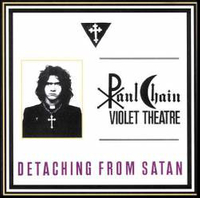In 1984, Paul Chain officially splintered off from the rest of Death SS and went on to pursue a solo career under the name of "Violet Theatre" (in reality, he basically just abandoned the "Death SS" moniker, as for a period of time he still continued collaborating with all of his former bandmates, which included bassist Claud Galley, percussionist Thomas Hand Chaste and weirdo vocalist Sanctis Ghoram). Becoming a soloist wasn't an entirely brand new experience for Paul though, seeing as how back in 1979 (while simultaneously a member of DSS) he had already formed the Paul Chain Group to serve as a type of creative outlet for his own improvisational music (although I think it was a relatively short-lived affair). Paul Dark and Eric Lumen were eventually hired to assist as the new bassist and drummer of Violet Theatre. Later that same year, the debut EP appropriately titled "Detaching From Satan" (an allusion to his departure from the Italian Horror Metal act and its occult/satanic imagery) was released through Minotauro records, and thus a new chapter was unveiled in Paul Chain's career as a musical artist. The material on this cult 23-minute Doom Metal offering turned out to be more experimental than all of the previous recordings that Paul had made with Death SS. However, that doesn't mean that the metallic (and even "gothic") elements of his former outfit have been entirely disposed of - They have now just been intertwined with psychedelic and experimental ones. The result was some of Paul's most creative and artistic songwriting at the present time (one can clearly tell that he wasn't content with merely being just another Black Sabbath clone). Despite the advancement in the songwriting and musicianship departments, the lo-fi production on "Detaching From Satan" isn't necessarily the most optimal though (but nonetheless still very much listenable).
Paul co-wrote the first track, "Occultism", with Maurice Cucchiarani, the vocalist of Italian Metal band, Run After To (a slightly modified version of it was later recorded on the 1985 demo, "Ginn And Djinn"). "Occultism" initiates with an eerie prelude reminiscent of one of those Italian Horror film soundtracks composed by Goblin. For about 90+ seconds, an organ mysteriously drones on while an assortment of metallic scrapes and other dissonant, unsettling SFX occur in the background. Aspects of this intro have a subtle Krautrock-ish vibe, and it wouldn't be too farfetched to believe that it might've been partially influenced by "Yeti" (the 18-minute improvisational track from German group, Amon Düül II). Once the actual song gets underway, the mood changes from ominous to a little bit more upbeat as we are met with a swampy groove. This part sounds like a concoction of 1970s Hard Rock such as Led Zeppelin (the beat sounds like it could have been devised by John Bonham himself), the Heavy Metal/proto-Doom Metal of Black Sabbath and the strand of Psychedelic Rock made by groups such as Amon Düül II and Flower Travellin' Band. A breathtakingly gorgeous choral segment (an interpretation of Johann Sebastian Bach's "Wer Nur Den Lieben Gott Lässt Walten"?) that appears to have been taken from an old, scratchy vinyl record introduces "Armageddon" before the song transforms into a potent NWOBHM-infused rocker. All the guitar solos here are fiery and raucous. One thing that can definitely take some time getting accustomed to at first though is Paul Chain's quirky, androgynous vocal performance and all the high-pitched, nasally wailing he occasionally does (in the process oftentimes sounding here like a mishmash of Robert Plant and Akira "Joe" Yamanaka. His voice is also quite similar to that of Pagan Altar's Terry Jones). Unfortunately for some listeners, these vocals will most likely prove to be a huge obstacle.
Paul has also become well-known for his usage of "phonetic language", which can be heard throughout "Detaching From Satan", including the nefarious "Voyage To Hell", where he unintelligibly snarls a whole lot of gibberish like a possessed priest who's gone insane and taken shelter deep inside the catacombs of Rome (and if he's actually singing in the English language, then that still makes no difference, as I cannot understand a single word coming out of this man's mouth). The mysterious Gila (AKA Sante Scardavi) steps out of the shadows and graces us with his vampiric, baritone croons on the final composition, "17 Day", which rarely ever fails to send chills down my spine (or give me goosebumps). Funereal and tenebrous, "17 Day" expresses itself with heavy, dirge-like riffs devoid of any light or color, as well as deliciously creepy organ that one would expect to hear featured in a grainy, black & white Horror film from the vintage era. In a number of ways, this special composition can actually be viewed as a precursor to all the Gothic Doom Metal that would come out a decade later in the 1990s (impressive!). Specific reissues of "Detaching From Satan" include "Pentagon Society" and "Vivid Eyes In The Dark" as bonus tracks (both were recorded in 1984 as well). These just happen to be self-indulgent, gargantuan Space Rock jams (à la Hawkwind) that clock in around 30 and 18 minutes each. For me, time usually just flies by when listening to them, but they might be too much for those who have the attention span of a moth. Getting into Paul Chain's music can be quite a challenge, but this 1984 EP is probably the best place for newcomers to start (well, either that or 1995's "Alkahest", which appears to be the album of his that always receives the most accolades). Anyone who actually dares to delve deep into this man's prolific and eccentric discography should keep in mind that it will, more likely than not, require some amount of time for his music to properly sink in.




Comments